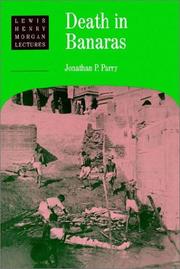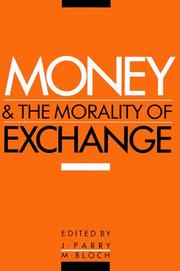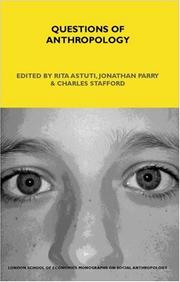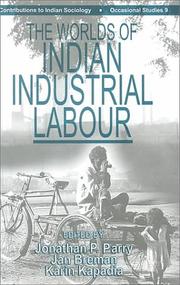| Listing 1 - 10 of 17 | << page >> |
Sort by
|

ISBN: 0521466253 0521460743 9780521460743 9780521466257 Year: 1994 Volume: 1988 Publisher: Cambridge: Cambridge university press,
Abstract | Keywords | Export | Availability | Bookmark
 Loading...
Loading...Choose an application
- Reference Manager
- EndNote
- RefWorks (Direct export to RefWorks)
Funeral rites and ceremonies, Hindu --- Death --- Cremation --- Hinduism --- Religious aspects --- Customs and practices --- Varanasi (Uttar Pradesh, India) --- Religious life and customs --- Hindu funeral rites and ceremonies --- Hinduism. --- Customs and practices. --- Varanasi (India) --- Funeral rites and ceremonies [Hindu ] --- India --- Funeral rites and ceremonies, Hindu - India - Våaråanasi. --- Death - Religious aspects - Hinduism. --- Cremation - Religious aspects - Hinduism. --- Våaråanasi (India) - Religiouslife and customs. --- Funeral rites and ceremonies, Hindu - India - Varanasi (Uttar Pradesh) --- Death - Religious aspects - Hinduism --- Cremation - Religious aspects - Hinduism --- Hinduism - Customs and practices --- Varanasi (Uttar Pradesh, India) - Religious life and customs
Book
ISBN: 0203712463 1351362844 Year: 2020 Publisher: London : Routledge,
Abstract | Keywords | Export | Availability | Bookmark
 Loading...
Loading...Choose an application
- Reference Manager
- EndNote
- RefWorks (Direct export to RefWorks)
Classes of Labour: Work and Life in a Central Indian Steel Town is a classic in the social sciences. The rigour and richness of the ethnographic data of this book and its analysis is matched only by its literary style. This magnum opus of 732 pages, an outcome of fieldwork covering twenty-one years, complete with diagrams and photographs, reads like an epic novel, difficult to put down. Professor Jonathan Parry looks at a context in which the manual workforce is divided into distinct social classes, which have a clear sense of themselves as separate and interests that are sometimes opposed. The relationship between them may even be one of exploitation; and they are associated with different lifestyles and outlooks, kinship and marriage practices, and suicide patterns. A central concern is with the intersection between class, caste, gender and regional ethnicity, with how class trumps caste in most contexts and with how classes have become increasingly structured as the structuration' of castes has declined. The wider theoretical ambition is to specify the general conditions under which the so-called working class' has any realistic prospect of unity.
Social classes --- Working class --- Iron and steel workers --- Bhilai (India) --- Social conditions.

ISBN: 0521367743 052136597X 9780521367745 9780521365970 9780511621659 0511875614 0511621655 Year: 1989 Publisher: Cambridge: Cambridge university press,
Abstract | Keywords | Export | Availability | Bookmark
 Loading...
Loading...Choose an application
- Reference Manager
- EndNote
- RefWorks (Direct export to RefWorks)
This volume deals with the way in which money is symbolically represented in a range of different cultures, from South and South-east Asia, Africa and South America. It is also concerned with the moral evaluation of monetary and commercial exchanges as against exchanges of other kinds. The essays cast radical doubt on many Western assumptions about money: that it is the acid which corrodes community, depersonalises human relationships, and reduces differences of quality to those of mere quantity; that it is the instrument of man's freedom, and so on. Rather than supporting the proposition that money produces easily specifiable changes in world view, the emphasis here is on the way in which existing world views and economic systems give rise to particular ways of representing money. But this highly relativistic conclusion is qualified once we shift the focus from money to the system of exchange as a whole. One rather general pattern that then begins to emerge is of two separate but related transactional orders, the majority of systems making some ideological space for relatively impersonal, competitive and individual acquisitive activity. This implies that even in a non-monetary economy these features are likely to exist within a certain sphere of activity, and that it is therefore misleading to attribute them to money. By so doing, a contrast within cultures is turned into a contrast between cultures, thereby reinforcing the notion that money itself has the power to transform the nature of social relationships.
Anthropologie économique --- Economic anthropology --- Economische antropologie --- Money --- Argent --- Moral and ethical aspects --- Aspect moral --- Exchange --- Economic anthropology. --- Cross-cultural studies. --- Social aspects --- #SBIB:39A4 --- 174.5 --- 336.74 --- Toegepaste antropologie --- Economische ethiek. Speculatie --- Geld. Geldwezen. Monetaire sector. --- 336.74 Geld. Geldwezen. Monetaire sector. --- 174.5 Economische ethiek. Speculatie --- Currency --- Monetary question --- Money, Primitive --- Specie --- Standard of value --- Finance --- Value --- Banks and banking --- Coinage --- Currency question --- Gold --- Silver --- Silver question --- Wealth --- Commerce --- Economics --- Supply and demand --- Commerce, Primitive --- Economics, Primitive --- Ethnology --- Cross-cultural studies --- Social aspects&delete& --- Geld. Geldwezen. Monetaire sector --- Exchange - Cross-cultural studies. --- Money - Social aspects - Cross-cultural studies. --- Social Sciences --- Anthropology --- Exchange - Cross-cultural studies --- Money - Social aspects - Cross-cultural studies --- Monnaie --- Échange --- Système monétaire --- Anthropologie sociale --- Aspects sociaux --- Études interculturelles

ISBN: 0521248752 0521270375 1316040860 0511607644 9780521270373 9780511607646 9780521248754 Year: 1989 Publisher: Cambridge: Cambridge university press,
Abstract | Keywords | Export | Availability | Bookmark
 Loading...
Loading...Choose an application
- Reference Manager
- EndNote
- RefWorks (Direct export to RefWorks)
It is a classical anthropological paradox that symbols of rebirth and fertility are frequently found in funerary rituals throughout the world. The original essays collected here re-examine this phenomenon through insights from China, India, New Guinea, Latin America, and Africa. The contributors, each a specialist in one of these areas, have worked in close collaboration to produce a genuinely innovative theoretical approach to the study of the symbolism surrounding death, an outline of which is provided in an important introduction by the editors. The major concern of the volume is the way in which funerary rituals dramatically transform the image of life as a dialectic flux involving exchange and transaction, marriage and procreation, into an image of a still, transcendental order in which oppositions such as those between self and other, wife-giver and wife-taker, Brahmin and untouchable, birth and therefore death have been abolished. This transformation often involves a general devaluation of biology, and, particularly, of sexuality, which is contrasted with a more spiritual and controlled source of life. The role of women, who are frequently associated with biological processes, mourning and death pollution, is often predominant in funerary rituals, and in examining this book makes a further contribution to the understanding of the symbolism of gender. The death rituals and the symbolism of rebirth are also analysed in the context of the political processes of the different societies considered, and it is argued that social order and political organisation may be legitimated through an exploitation of the emotions and biology.
Funeral rites and ceremonies --- Death --- Religion --- Fertility cults --- Funérailles --- Mort --- Fécondité --- Rites et cérémonies. --- Cultes --- Funeral rites and ceremonies. --- Death. --- Religion. --- Fertility cults. --- 291.23 --- Religion, Primitive --- Atheism --- God --- Irreligion --- Religions --- Theology --- Funerals --- Mortuary ceremonies --- Obsequies --- Manners and customs --- Rites and ceremonies --- Burial --- Cremation --- Dead --- Mourning customs --- Cults, Fertility --- Cults --- Dying --- End of life --- Life --- Terminal care --- Terminally ill --- Thanatology --- 291.23 Godsdienstwetenschap: eschatologische doctrines; leven na de dood --- 291.23 Godsdienstwetenschap: opstanding; reïncarnatie; metamorfose; zielsverhuizing; paradijs; hel; vagevuur --- Godsdienstwetenschap: eschatologische doctrines; leven na de dood --- Godsdienstwetenschap: opstanding; reïncarnatie; metamorfose; zielsverhuizing; paradijs; hel; vagevuur --- Philosophy --- Philosophical anthropology --- Physiology: reproduction & development. Ages of life --- Cryomation --- Social Sciences --- Anthropology --- Ritus i cerimònies fúnebres --- Religió --- Fecunditat
Book
ISBN: 1351378066 1315146975 1351378074 Year: 2018 Publisher: Abingdon, Oxon : Routledge,
Abstract | Keywords | Export | Availability | Bookmark
 Loading...
Loading...Choose an application
- Reference Manager
- EndNote
- RefWorks (Direct export to RefWorks)
"What distinguishes Persistence of Poverty from most other poverty studies is the way in which it conceptualises the problem. This volume offers a variety of alternative analytical perspectives and fresh insights into poverty that are key to addressing the problem. In looking at the day to day lived realities of the poor the volume points out that in order to understand poverty one must take into account the wider system of class and power relations in which it is rooted. This volume suggests that 'democracy in India may be as big a part of the problem as it is of the solution.'"--Provided by publisher.
Poverty --- Poor --- India --- Economic conditions. --- Social conditions.

ISBN: 9781845207489 1845207483 9781845207496 1845207491 Year: 2007 Volume: v. 76 Publisher: Oxford : Berg publishers,
Abstract | Keywords | Export | Availability | Bookmark
 Loading...
Loading...Choose an application
- Reference Manager
- EndNote
- RefWorks (Direct export to RefWorks)
Anthropology seems to shy away from the big, comparative questions that ordinary people in many societies find compelling. This title contains essays that explore birth, death and sexuality, puzzles about the relationship between science and religion, questions about the nature of ritual, work and genocide, and our personal fears and desires.
Anthropology --- Anthropologie --- Philosophy. --- Philosophie --- Anthropology -- Philosophy. --- Anthropology - General --- Social Sciences --- Philosophy --- #SBIB:39A3 --- Antropologie: geschiedenis, theorie, wetenschap (incl. grondleggers van de antropologie als wetenschap) --- Philosophie.
Book
ISBN: 9780198075523 0198075529 Year: 2011 Publisher: New Delhi: Oxford university press,
Abstract | Keywords | Export | Availability | Bookmark
 Loading...
Loading...Choose an application
- Reference Manager
- EndNote
- RefWorks (Direct export to RefWorks)
Equality --- Social change --- Béteille, André

ISBN: 0761993959 8170368723 9788170368724 9780761993957 Year: 1999 Publisher: New Delhi: Sage,
Abstract | Keywords | Export | Availability | Bookmark
 Loading...
Loading...Choose an application
- Reference Manager
- EndNote
- RefWorks (Direct export to RefWorks)
Book
ISBN: 9781785336782 9781800731998 1785336789 1785336797 180073199X Year: 2018 Publisher: New York : Berghahn Books,
Abstract | Keywords | Export | Availability | Bookmark
 Loading...
Loading...Choose an application
- Reference Manager
- EndNote
- RefWorks (Direct export to RefWorks)
Présentation de l'éditeur : "Bringing together ethnographic case studies of industrial labor from different parts of the world, Industrial Labor on the Margins of Capitalism explores the increasing casualization of workforces and the weakening power of organized labor. This division owes much to state policies and is reflected in local understandings of class. By exploring this relationship, these essays question the claim that neoliberal ideology has become the new ‘commonsense’ of our times and suggest various propositions about the conditions that create employment regimes based on flexible labor."
Precarious employment. --- Flexible work arrangements. --- Working class. --- Labor movement.
Book
ISBN: 1785336797 Year: 2018 Publisher: New York, [New York] ; Oxford, [England] : Berghahn Books,
Abstract | Keywords | Export | Availability | Bookmark
 Loading...
Loading...Choose an application
- Reference Manager
- EndNote
- RefWorks (Direct export to RefWorks)
Bringing together ethnographic case studies of industrial labor from different parts of the world, Industrial Labor on the Margins of Capitalism explores the increasing casualization of workforces and the weakening power of organized labor. This division owes much to state policies and is reflected in local understandings of class. By exploring this relationship, these essays question the claim that neoliberal ideology has become the new ‘commonsense’ of our times and suggest various propositions about the conditions that create employment regimes based on flexible labor.
| Listing 1 - 10 of 17 | << page >> |
Sort by
|

 Search
Search Feedback
Feedback About UniCat
About UniCat  Help
Help News
News